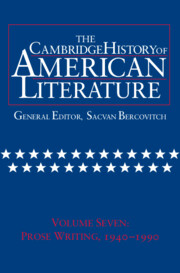Book contents
- Frontmatter
- Introduction
- The Drama, 1940—1990
- 1 Introduction
- 2 Tennessee Williams
- 3 Arthur Miller
- 4 Edward Albee
- 5 Sam Shepard
- 6 David Mamet
- 7 Changing America: A Changing Drama?
- Fiction and Society, 1940–1970
- After the Southern Renascence
- Postmodern Fictions, 1960–1990
- Emergent Literatures
- Appendix: Biographies
- Chronology, 1940–1990
- Bibliography
- Index
1 - Introduction
from The Drama, 1940—1990
Published online by Cambridge University Press: 28 March 2008
- Frontmatter
- Introduction
- The Drama, 1940—1990
- 1 Introduction
- 2 Tennessee Williams
- 3 Arthur Miller
- 4 Edward Albee
- 5 Sam Shepard
- 6 David Mamet
- 7 Changing America: A Changing Drama?
- Fiction and Society, 1940–1970
- After the Southern Renascence
- Postmodern Fictions, 1960–1990
- Emergent Literatures
- Appendix: Biographies
- Chronology, 1940–1990
- Bibliography
- Index
Summary
The united states emerged from the Second World War with a powerful economy, a restored faith in capitalism, and a society rededicated to national myths of material advancement and moral and ideological purity. It also emerged with three major dramatists, in Eugene O’Neill, Tennessee Williams, and Arthur Miller, who appeared to dissent from this consensus.
There was a confidence about prewar theater that, for the most part, did not survive the conflict. The social dramas of Clifford Odets were predicated on the possibility of change; the comedies of Philip Barry and William Saroyan, largely on a contentment with the given. Thornton Wilder celebrated familiar pieties in Our Town, and although The Skin of Our Teeth suggested a more radical revisioning at the level of style, the ironies were never allowed to disturb a fundamental equanimity. Lillian Hellman’s plays relied on a disruption of the moral world finally contained by the structure of melodrama, and if Robert Sherwood, equally drawn to melodrama, offered a lament for the collapse of democratic and Christian values that brought him to the edge of an affecting paradox, he then turned with apparent relief to the banalities of plot for a reassurance that had no place in the logic of his drama. Indeed, his case became, in a sense, paradigmatic. Aware of the dislocations of social and moral purpose, he offered faith and a kind of desperate belief in human goodness that he could never adequately dramatize but only assert.
- Type
- Chapter
- Information
- The Cambridge History of American Literature , pp. 1 - 9Publisher: Cambridge University PressPrint publication year: 1999



